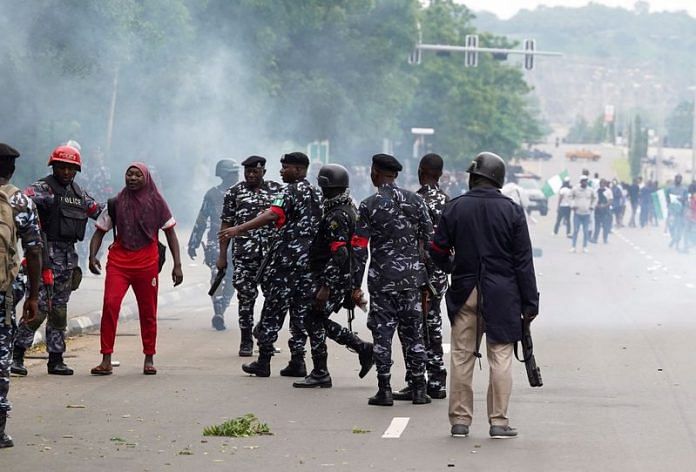By Ope Adetayo and Bosan Yakusak
ABUJA/KADUNA (Reuters) -At least three protesters were killed in Nigeria’s Kaduna state on Thursday, Reuters reporters and eyewitnesses said, as demonstrators rallied across the West African nation against rising cost of living and governance issues.
Kaduna state police spokesperson Mansur Hassan said the police fired tear gas at protesters and not live ammunition. Also police fired tear gas in the capital city Abuja to disperse crowds of protesters, according to eyewitness accounts.
Protesters demonstrated in Abuja, the commercial capital Lagos and several other cities to show discontent with economic reforms that have led to rampant inflation and inflicted increasing hardship on ordinary Nigerians. President Bola Tinubu has vowed to pursue the changes that he says are needed to keep the country afloat.
Authorities deployed armed security personnel in an effort to preempt potential violence.
In Lagos, armed police watched as protesters marched toward the government house and then proceeded to two locations that were authorised for the protest. Some shopping malls in the city were shut and guarded by a heavy police presence.
Inspired by protests in Kenya in June that led to the government there scrapping some planned tax increases, Nigerians are mobilizing online to demand the reinstatement of subsidies for petrol and electricity, free primary and secondary education and measures to combat insecurity, among other demands.
In Abuja, the military mounted roadblocks along the highway leading into town, while some protesters gathered at a stadium.
Youths demonstrated in the city of Maiduguri, the hotbed of a militant insurgency in the northeast of the country, in the face of a heavy security presence, to voice their frustration at the government and its policies.
TINUBU REFORMS
The government said before the protests it was open to dialogue.
Tinubu has asked citizen to bear with his reforms, but citizen complain that politicians are not making enough sacrifices themselves.
After taking office more than a year ago, Tinubu removed some fuel subsidies, devalued the naira currency and later hiked electricity tariffs, moves that have sent inflation soaring past 34%, eroding incomes.
Consumer inflation rose to a new 28-year high of 34.19% in annual terms in June.
Nigerians are also grappling with widespread insecurity, which has damaged the farming sector, while armed gangs kidnap residents and school children for ransom in the north.
Labour unions have led previous protests. But Thursday’s march was mostly by unemployed youth – introducing a new element for the government trying to lessen the impact of its economic policies
Tinubu signed a new minimum wage into law on Monday to help workers cope with hardship caused by his economic changes, but many of the country’s 200 million people are either self-employed or do not have jobs.
(Additional reporting by Camillus Eboh in Abuja, Ahmed Kingimi in Maiduguri and Isaac Anyaogu in LagosWriting by Chijioke OhuochaEditing by Bate Felix and Frances Kerry)
Disclaimer: This report is auto generated from the Reuters news service. ThePrint holds no responsibilty for its content.



